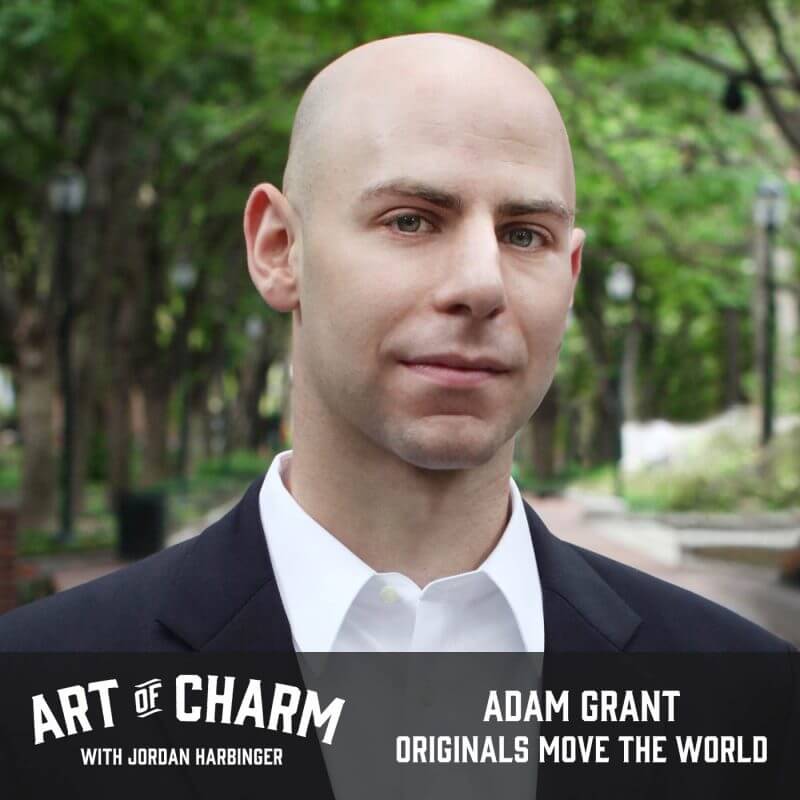Adam Grant (@AdamMGrant), author of Originals: How Non-Conformists Move the World, revisits the show to explain how defying conformity gives us the power to change the world instead of just accepting it as it is.
The Cheat Sheet:
- Great creators don’t necessarily have the deepest level of expertise.
- Question the default instead of taking the status quo for granted.
- Learn how to triple the number of ideas you generate.
- Procrastinate strategically.
- Balance your risk portfolio.
- And so much more…
[aoc-subscribe]
In the quest for happiness, many of us choose to enjoy the world as it is. Originals, on the other hand, embrace the uphill battle and strive to make the world what it could be. While becoming original is not the easiest path in the pursuit of happiness, it leaves us perfectly poised for the happiness of pursuit.
More About This Show
As the youngest tenured and highest rated professor at the Wharton School of the University of Pennsylvania and a New York Times bestselling author, Adam Grant is an original. That is, he’s a creator who’s able to see the world in new and unique ways. As he tells us in his book Originals: How Non-Conformists Move the World, great creators don’t necessarily have the deepest expertise, but rather seek out the broadest perspectives.
Thousands of hours of deliberate practice, as we’ve talked about on the show before, is a way to gain expertise in a certain area, but it’s also conformity. “That kind of practice does make perfect, but it doesn’t make new,” says Adam. “The more you repeat a scale over and over again, the more you tend to get stuck in the way that everybody else has done it.”
So how do we ensure that we’re expert enough to make a change without getting so entrenched in our ways that innovation is stifled? Adam points to Steve Jobs, who said the key to creativity is just having a different bag of experiences from anyone else. “You don’t actually get…blind to alternative ways of seeing things if you’re constantly broadening your knowledge base. We see this with Nobel Prize-winning scientists, who are much more likely than their peers to have artistic hobbies.”
Galileo, for instance, was the first person to identify mountains on the moon — not because he was the first astronomer to see them through a telescope, but because he had trained in a drawing technique that involved shading to depict levels of elevation and it allowed him to connect the dots in a way no one else had before. “Artistic training made him a better scientist,” says Adam.
This is also why it’s long been said that travel broadens the mind; it exposes us to new things that, if we have an original mindset, we can combine in ways perhaps no one else has based on our own unique, experience-gained perspectives.
The Browser Effect
Another curious indicator of originality was brought to light in a study correlating Internet browser choice with job performance among customer service representatives and salespeople. “I was sitting in a conference and this economist Michael Housman was presenting his data. He said, ‘We have this evidence that people who use Chrome and Firefox are, on average, significantly better at their customer service and sales jobs, and they also stay 15 percent longer than Internet Explorer and Safari users.”
Initially, Adam thought this phenomenon might have something to do with Chrome and Firefox users being a little more tech savvy than their Internet Explorer and Safari preferring peers, but the fact is, all browsers are pretty similar on the level of expertise it takes to use them. The difference, it turns out, really has more to do with being original enough to select a browser from off the beaten path rather than conforming to the default browser already installed on a computer.
“So people hear about this and they’re like, ‘Great! So if I want to get better at my job, I just need to download a different browser?’ No! It’s about being the kind of person who has the instinct to ask, ‘Is there another option out there?’ and then seek it out. That’s kind of a preview of how a lot of people approach their jobs.”
Having taken the initiative to improve their circumstances at work, they realized they could shape their environment — or at least their job a little bit. Incidentally, two-thirds of the workers polled preferred to stick with the default browser, so the original thinkers seem to be in the minority. Those of us who learn to think a bit more like those in the minority — originally and creatively — will have a distinct advantage over the majority of our peers in the long run.
Listen to this episode of The Art of Charm in its entirety to learn more about why people in the tech world could benefit from striving to be more like MacGuyver (mullet optional), how we’re all vulnerable to kleptomnesia, why many of us talk ourselves into accepting injustices in spite of being averse to unfairness, how cultivating originality makes us less afraid to rock the boat when we understand what changes need to be made, why you don’t have to be a chronic risk-taker to pursue the life of an entrepreneur (and why you’re 33 percent less likely to fail if you can balance your risk portfolio with a safety net), how to triple your idea generation and increase your odds of success, precrastination vs. procrastination, and lots more.
Check out Adam’s site to gauge your own originality with a free assessment, and listen to his last, equally thought-provoking appearance on The Art of Charm: Give and Take: How Much Can You Give? (Episode 311).
THANKS, ADAM GRANT!
Resources from this episode:
- Originals: How Non-Conformists Move the World by Adam Grant
- Give and Take: How Much Can You Give? (Episode 311)
- Adam Grant’s website
- Give and Take: Why Helping Others Drives Our Success by Adam Grant
- Adam Grant at Twitter
You’ll also like:
- The Art of Charm Bootcamps
- Best of The Art of Charm Podcast
- The Art of Charm Toolbox
- The Art of Charm Toolbox for Women
On your phone? Click here to write us a well-deserved iTunes review and help us outrank the riffraff!




